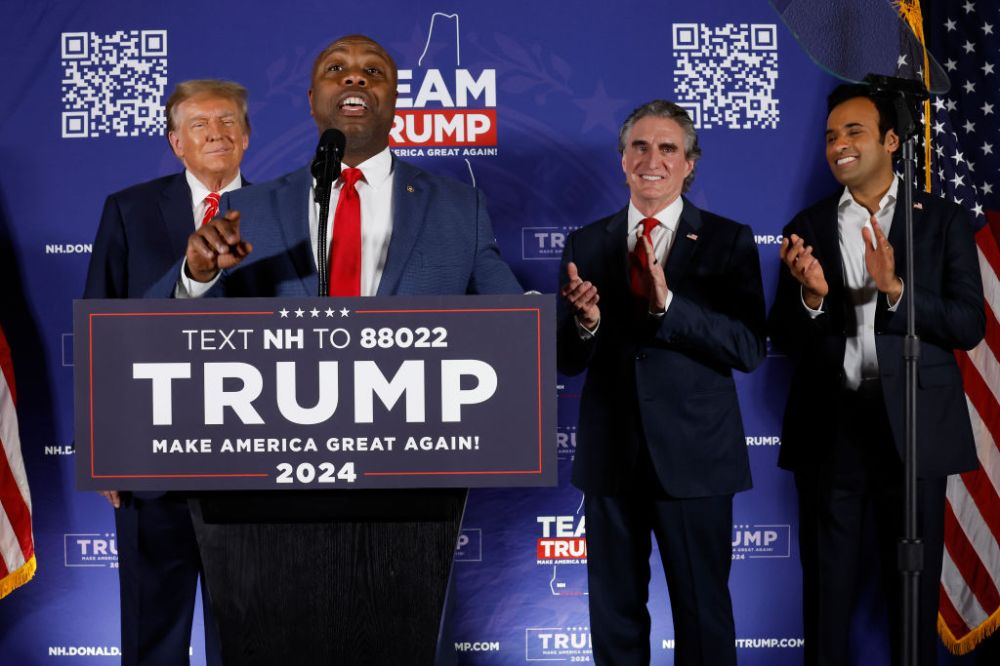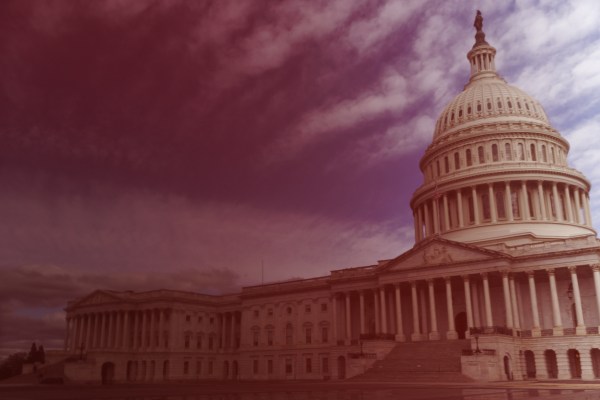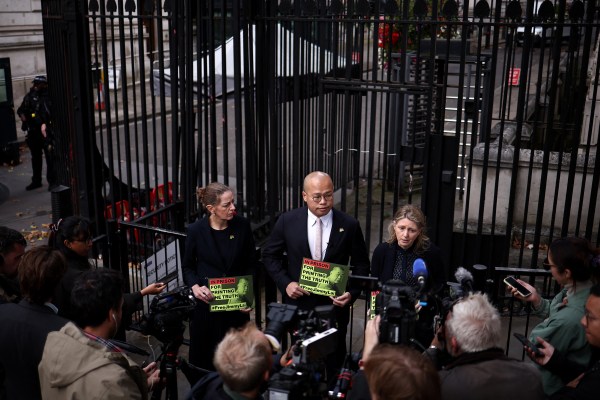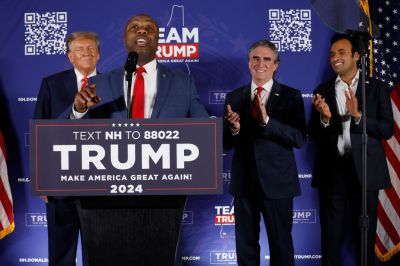The last time Donald Trump chose a running mate, he did it in the least Trumpy way possible.
He’s a narcissist who relishes displays of supplication. And he made his name in entertainment by sponsoring competitions, from producing beauty pageants to hosting a game show. All of that points to a theatrical vice presidential selection process with the “contestants” scrambling to outperform each other publicly for his approval.
That’s not how it went in 2016.
Perhaps because he was new to politics and felt unsure about what the Republican base wanted, his veepstakes that cycle was a low-key affair. Trump reportedly favored Chris Christie, a fellow bridge-and-tunnel guy whom he’d known for years, but was talked into choosing Mike Pence by campaign manager Paul Manafort. Manafort recognized that it was more important to pick someone who’d make evangelical voters comfortable than someone who’d make Trump comfortable.
No drama, no competition, just a clear-eyed bottom-line decision to maximize the odds of winning.
In 2024, Trump is no longer a novice and the Republican base no longer requires courting. He rules like a king and a king is free to choose his heir however he likes. Go figure that King Donald would do so with … a beauty pageant and a game show.
The beauty pageant was held this weekend at Mar-a-Lago during a joint fundraiser for Trump’s campaign and the Republican National Committee. Numerous vice presidential hopefuls attended; on Saturday evening some of them were given the honor of parading onstage alongside the emcee.
Sens. Tim Scott of South Carolina and J.D. Vance of Ohio, Rep. Elise Stefanik of New York, and North Dakota Gov. Doug Burgum are all shortlisters and they’re all there in frame. Conspicuously missing is South Dakota Gov. Kristi Noem, who was in the room but didn’t get the call to come on up after receiving a very low score on congeniality.
The game show followed on Sunday when various hopefuls appeared on Sunday morning news programs to sing the king’s praises. Scott, Stefanik, and Burgum all turned up for the interview portion of the competition, as did Sens. Marco Rubio of Florida and Tom Cotton of Arkansas. There they faced hard questions like “Should insurrectionists be pardoned?” and “Will you accept the results of this election?” knowing that the wrong answer could eliminate them.
Sheesh. Thank God there’s no swimsuit component to all this or else I’d expect a tryhard like Scott to start showing up on TV in a banana hammock.
From the standpoint of classical liberalism, there’s no such thing as a “good” VP choice for Trump. Anyone willing to support him for president is, by definition, unworthy of high office in the United States. But Americans have gotten used to lesser-of-two-evils political choices over the last decade and the one before us is no different. Someone’s going to end up on the Republican ticket this year, and a few of the possibilities before us are clearly worse than others.
Whom should conservatives be rooting for in this very special veepstakes episode of The Apprentice?
The cynical answer is that we should want the worst running mate possible for Trump. A truly terrible candidate would reduce his chances of winning, no?
And if he won anyway, an awful VP would remind the country periodically of what a terrible choice it had made. If you want to defeat post-liberalism long-term, Americans will need a good hard dose of it to put them off the stuff forever. So why not a Donald Trump/Mike Flynn ticket? Heighten the contradictions! The worse, the better!
I dislike that approach. I’m stuck living in this declining country and would like it to be run as well (or as least badly) as possible while I’m here. Plus, there’s no guarantee that “worse” in this case would lead to “better” in the long run without grievous misery in between. Many other countries have paid an exorbitant price for experimenting with authoritarianism; I would not want to run a similar experiment with a martial-law enthusiast like Flynn one heartbeat away.
Conservatives should prefer the least bad candidate available. In deciding who that is, there are obvious questions to ask. For starters, who would do the least amount of civic damage as vice president? We should be confident that our choice would pass the Mike Pence test in January 2029, needless to say, and would act as a restraint on Trump’s worst impulses rather than as an enabler in advising him.
Who would be likely to govern as a conservative if Trump died in office and the VP succeeded to the presidency? Expectations on that point will need to be realistic: It’s a populist party now, so a pure Reaganite agenda is unfeasible. Even a recognizably conservative vice president will have to do some pandering as president to the post-liberal culture warriors.
Who, as heir apparent, would have the healthiest influence on the GOP long-term? Ideally, conservatives should prefer someone as vice president who’ll not only behave responsibly in office and prefer classically liberal policies but who’ll stand a chance at defeating the various authoritarian monsters who are destined to contend for the party’s nomination in 2028.
On top of all that, there are what I’d call intangible factors. Most of us will prefer a running mate with governing experience, who’s shown some policy chops. And most of us will recoil at seeing an especially soulless and cynical Trump toady rewarded for their servility with a slot on the national ticket.
All of that said, I think we can rule out several candidates off the top on suspicion that they’d fail the Pence test.
Kristi Noem, Marsha Blackburn, and Gov. Sarah Huckabee Sanders would all flunk it, I think. Sanders owes her national profile to Trump, having served as his White House press secretary; she wouldn’t repay him by “betraying” him. Neither would Blackburn, an undistinguished Senate backbencher with no grassroots following who’s in the mix because she might appeal to women voters. Trump would expect total loyalty in exchange for making her the second most powerful politician in the party overnight and would likely get it.
As for Noem, a politician who can’t stop talking about killing dogs almost certainly isn’t going to be vice president. Even Trump is reportedly mortified by her tone-deafness. (Wait until he sees the latest polling.) In a way, her PR disaster makes her a more appealing pick for him: If he chooses her as VP after all this, she’ll owe him her very soul. But it makes her less appealing to conservatives for the same reason. A candidate who boasted about shooting a puppy in the face because she thought doing so would impress Trump isn’t going to hold the line on civic decency inside the White House.
So much for the long shots.
Among the top tier, the worst by far from the standpoint of classical liberalism is J.D. Vance.
Vance would also fail the Pence test—by his own admission—but has other sins that disqualify him. His economic impulses are suspicious. His foreign policy views are obnoxious. He’s served in public office for little more than a year. And he’s the most earnest authoritarian on the list, having once gone as far as to encourage Trump to ignore court orders. He won’t restrain his boss—rather the opposite.
If Vance were to ascend to the high office, it’s possible that his tenure would cement post-liberal nationalism as the GOP’s dominant ideology. As president, he might even push the envelope on executive power further than Trump has, hoping to ingratiate himself expeditiously to a Republican base that reliably responds to “strength.”
Vance is so much worse than his rivals that I think it’s defensible for conservatives to be indifferent to whom Trump chooses so long as it isn’t him.
Elise Stefanik is an intriguing choice because she’s taken moderate positions on policy for most of her career. As VP, I expect she’d push Trump toward swing voters in the center, partly because her own preferences lie that way and partly because she’s a careerist who’s forever looking ahead to the next election. Having her as vice president would also be reassuring if you worry about the right’s penchant for forming personality cults around demagogues. If Trump dies and she inherits the top job, no one’s going to form a cult of Elise. It’s hard for a woman to be an authoritarian movement’s idea of “strong.”
But Stefanik grossly fails the Pence test, which is the whole reason Trump is interested in her in the first place. The last five years of her career have been a sustained exercise in showing him that she’ll say and do anything to earn his patronage. She and Vance also deserve special scorn from conservatives for having begun the Trump era seemingly clear-eyed about what he represents and then reconciling themselves to him for the sake of ambition. They’re who I had in mind in talking about the “intangible” of extreme sycophancy that makes one’s blood boil. It’s impossible to root for her.
The most intriguing populist on Trump’s list is Tom Cotton, as he’s the first candidate we’ve considered here who probably wouldn’t fail the Pence test. Cotton was one of the good guys on January 6, remember. If Trump asked him to overturn an election, he’d probably say no.
Probably. But don’t hold me to that.
Cotton’s view of foreign policy also runs closer to Ronald Reagan’s than to Donald Trump’s. He’s enough of a Trumpist to complain about NATO countries not meeting their defense obligations, yet enough of a Reaganite to celebrate when new nations are admitted to the alliance. When the Senate’s latest aid package for Ukraine came to the floor last month, he voted yes.
My misgivings about him as VP have to do with his fondness for getting rough with political enemies. Famously, he called on Trump to invoke the Insurrection Act and send regular military troops against rioters in 2020. More recently, he urged Americans to “take matters into your own hands” when protesters block public roads. The last thing we need in a Trump second term is a vice president egging him on to be more brutal in his displays of executive strength.
Still, Cotton has more than a decade of experience in Congress and has been relatively restrained in his MAGA toadying compared to some of his competitors. As vice president, he’d double the collective IQ in Trump’s West Wing. We could do worse than him as the heir apparent in 2028 too: How many other populists contending for the nomination next cycle will be able to say that they opposed the coup plot of 2020? His leadership could steer the nationalist right in a somewhat healthier direction.
I can live with him as the VP nominee. But there are stronger choices.
Gun to my head, I think I prefer Doug Burgum as Trump’s running mate.
How we reached the point where Burgum is a top-tier candidate is a mystery to me, but we have and he is. He has executive experience as a governor; he’s succeeded fabulously in business; he displayed a modicum of conservative principle during last year’s primary debates; and his track record of humiliating himself to earn Trump’s favor is notably shorter than everyone else’s. He also has the right attitude about January 6—or had, I suppose.
I’m not sure how he landed on Trump’s radar. The fact that he’s mega-rich probably has something to do with it, as Burgum can help close any fundraising gaps with the Biden campaign. (He distinguished himself by his spending during the primary, remember.) A smart, decent, classically liberal governor from the Midwest came through in the clutch as VP at the decisive moment of Trump’s first term. Why not root for the same type this time?
I lean toward Burgum because, unlike everyone else on the shortlist, I have no affirmative reason to fear and/or loathe him. But he does have some issues. He has a Stefanik problem insofar as it’s hard to imagine any scenario in which he ends up as the nominee in 2028; the populists will eat him alive. He also potentially has a Blackburn problem in that, by catapulting him from obscurity to the brink of global power, Trump would have done Burgum a favor that he can never repay. If he calls in that favor by asking him to participate in a coup, how confident should we be that the governor will resist?
I don’t think Burgum will be the pick, though, and not just because he’s hardly an ardent Trumpist and was unknown to the MAGA base until about six minutes ago. Unlike the other shortlisters, he adds nothing to the ticket. Trump has been considering women and nonwhite men in hopes of attracting constituencies that resisted him during his first two campaigns for president. Why would he abandon that strategy now to go with yet another Old White Guy?
All of which brings us to—sigh—Tim Scott and Marco Rubio.
It would be wrong to say that I “hope” Scott or Rubio becomes VP, having lost respect for both of them long ago. Rubio’s journey from Tea Party conservative to Trumpist began not long after he stopped calling Trump a “con artist” who can’t be trusted with the nuclear codes in 2016 and lately has seen him whining about the “political” nature of Trump’s prosecutions and voting against the Senate Ukraine aid package. Scott conducted himself with a bit more dignity than that for most of the past eight years but, with the veepstakes now in full swing, he’s taken to making up for lost time by kowtowing to Trump in ways so embarrassing that even Rubio would blush.
Neither deserves to be rewarded for their servility with a spot on the ticket. But.
Both men resisted the Cruz/Hawley effort on January 6 to reject the electoral votes from Biden-won swing states like Arizona. Both have spent more than a decade in Congress and, unlike many of their colleagues, have engaged in serious (if often unsuccessful) legislative pursuits. Both are still recognizably conservative on policy, particularly with respect to social issues, although Rubio’s ardor for building a nationalist working-class party has increasingly led him off the path. And both seem well-liked by their Senate colleagues, Scott especially, which raises the prospect of fruitful bipartisan cooperation if either were to ascend to the presidency.
Neither man strikes me as demagogic by impulse the way Cotton occasionally does when there’s left-wing mayhem unfolding somewhere.
Only a fool would bet heavily on Tim Scott’s or Marco Rubio’s willingness to tell Trump “no” or advise him against some illiberal executive action, but I’d bet a little on it. The contempt that Never Trumpers feel for them derives from the suspicion that they’re poseurs who have postured as populists to get ahead while secretly harboring classically liberal beliefs; if that theory is true then it’s a point in their favor in the veepstakes, no? We want classical liberals, secret or not, around Trump when the next Pence test arrives.
The fact that both men came to Congress in the pre-Trump, small-government era of Republican politics points in the same direction. Somewhere deep inside, there’s still good in them. And unlike someone like Vance, they established a bit of stature and success in the party through their own efforts, before Trump smiled on them. They don’t owe him everything. At the moment of truth, they might do as Darth Vader (and Mike Pence) did and toss the Emperor down the shaft.
One more thing about Scott and Rubio. Although they’ll never truly be embraced by post-liberals, it’s conceivable that as VP either might prevail in the 2028 primary. Between the name recognition they’d enjoy from their time as vice president and the GOP’s delight at the thought of a nonwhite candidate leading them against woke progressivism, either might fend off the DeSantises and Vances to become the next nominee. I wouldn’t bet heavily on it, admittedly—but, again, I’d bet a little.
Any outcome that prevents populism from being further normalized and entrenched as Republican orthodoxy is the least bad outcome for conservatism. So as much as I’d hate for Scott or Rubio to profit professionally from having sold their souls to a demagogic charlatan, they’re … probably the best classical liberals can do this fall. Apart from seeing Trump and his movement crushed and chastised, I mean.
If everything shakes out fortuitously, the next veepstakes piece I write in 2028 might not need to be approached from the standpoint of which candidates are most and least likely to become fascists once in office. Imagine!







Please note that we at The Dispatch hold ourselves, our work, and our commenters to a higher standard than other places on the internet. We welcome comments that foster genuine debate or discussion—including comments critical of us or our work—but responses that include ad hominem attacks on fellow Dispatch members or are intended to stoke fear and anger may be moderated.
With your membership, you only have the ability to comment on The Morning Dispatch articles. Consider upgrading to join the conversation everywhere.